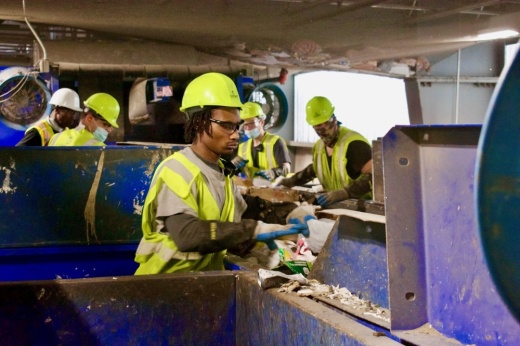Both Grapevine and Southlake contract with Republic Services for their waste and recycling management. During an April 4 Southlake City Council meeting, Republic’s Municipal Services Manager Vince Hrabal said the cost for trash collection is rising. This price increase comes from rising industry costs, such as trucks increasing in price, fuel costing more and paying more for labor compensation.
“There’s an adjustment to be made just for what costs are today,” Hrabal said.
Southlake’s contract with Republic expires Sept. 30. Hrabal said there will be an initial cost increase under a new contract to cover the cost of services.
Grapevine council renewed its 10-year franchise agreement with Republic in September.
Grapevine residents can expect to see a $2.50 increase in pickup rates over the next two years.
The 2023 residential rate for waste and recycling services is $16.91 per month. In 2024, the rate will increase to a monthly charge of $18.29. The 2022 rate was $15.79 per month.
Colleyville works with Community Waste Disposal for its waste and recycling services. The city’s first five-year contract began in 2017 before being renewed for three years in 2020. Colleyville’s current trash and recycling rate, which began Nov. 1, 2022, is $19.48. Last year’s rate was $16.14.
Colleyville Assistant City Manager Adrienne Lothery said a city’s trash and recycling rate can differ from other cities depending on its offered services. Along with trash and recycling, cities can offer brush, bulk or household hazardous waste pick-up.
“We aim to meet and deliver on whatever the community desires in terms of their service,” Lothery said.
For Colleyville, its price structure changed in 2022 for increased costs related to labor, fuel, landfill charges and the consumer price index, according to city documents. The consumer price index is the average price of goods and services purchased by households in a specified area.
Grapevine Environmental Manager Dewey Stoffels said rates were previously based on the consumer price index in the Dallas-Fort Worth area and the disposal cost that landfills charge waste companies.
Stoffels said further rate increases will be determined by the U.S. Bureau of Labor Statistics’s price index for garbage and trash, which is based on the average trash collection price seen nationally.
“The cost of living, everything’s increasing,” Stoffels said.
The Amazon effect
Republic Services offers trash and recycling services to about 125 North Texas cities, including Bedford, Euless, Plano and Roanoke. Recyclable materials from Grapevine and Southlake travel to the company’s regional Recycling Center in Plano for processing.
According to Jeremy Walters, manager of external communications, the company processes approximately 80,000 tons of recyclable material per year at its Plano center and has kept nearly 237,000 tons of material out of landfills since January 2019.
Recyclable materials the center processes include paper, cardboard, metal and glass.
Republic’s Operations Manager Ben Ayers said the recycling industry is seeing the “Amazon effect.” About 40% of the materials Republic processes is cardboard from shipping boxes, when he said it used to be paper at that amount.
“It’s not necessarily Amazon, it’s the way the world’s going now [that] everyone’s going to boxes and shipping,” he said. “We’ve seen the material composition of our recycle center flip within the past 10 or 15 years.”
Walters noted that Republic Services is looking to increase its ability to process polymer, which is a main ingredient in plastic. Plastics are often ground into flakes and turned into pellets to be purchased and made into new goods. At the end of the year, he said Republic will open its first recycling center for polymers in Las Vegas in late 2023.
“Few and far between does a bottle become a bottle again,” Walters said. “Republic Services is making key investments to advance the circularity of plastics.”
Education is key
Understanding which items can be recycled is key for the recycling industry, Walters said.
He said people may throw items in the recycling bin when they are unsure if it can actually be recycled, which is called “wish-cycling.” These materials, such as greasy pizza boxes or shopping bags, can then contaminate good recyclables or create safety hazards in the center.
“Recycling is a helpful tool to help protect the planet but in order for us to maximize our efforts, we need to recycle right,” said Walters. “When in doubt, throw it out—or better yet, when in doubt, find out.”
To help residents understand what can or cannot be recycled, Republic’s website www.recyclingsimplified.com provides education on recycling basics.
Southlake has a similar tool called Recycle Right that allows residents to insert the name of a material to see how it can be recycled or disposed of. Colleyville’s recycling webpage, found on the city’s website, has information on pick-up schedules, weight specifications and allowed bulk trash items.
Grapevine has its own app to help residents learn more about recycling services. The Recycle Coach app provides residents with information on the pick-up schedule, special pick up calendar dates and details recyclable items.
“Sometimes recycling rules do change,” Stoffels said.
Future of recycling
Southlake held a trash and recycling survey in March to get feedback from residents on the city’s current and future services with its trash provider Republic Services.
The survey asked residents about the cart size provided by Republic, satisfaction with pickup frequency and the importance of other methods for recycling and trash collection, according to Southlake Deputy Director of Public Works Lauren LaNeave who presented the survey’s results to council on April 4.
In the city’s current contract, Republic provides manual pickup, but that will no longer be an option in a new contract. LaNeave said most providers, including Waste Management and Frontier Waste Solutions, have moved to automation. Community Waste Disposal still offers manual collection.
Manual collection is done with employees that stand on the truck and place the materials into the collection space.
Community Waste Disposal Vice President Jason Roemer said the company is seeing the same challenges other providers are facing, such as labor costs and availability, but still utilizes manual collection as it provides cities and residents with flexibility. Rather than each resident needing the standardized bin size that the trucks can pick up, he said manual collection allows residents to use their own trash containers.
Automated collection is done by loading materials onto the side of the truck with bars that grab the trash or recycling bin. Hrabal said there are three main drivers to moving to automation: availability of laborers, rising cost to attract employees and safety.
“We’ve seen a diminishing pool of laborers that are willing to get out in the heat, out in the elements, and do this job,” he said. “The cost is continuing to rise at an accelerated pace to get and attract and keep these helpers.”
The industry is also encountering issues with space, according to Roemer.
Reducing the amount of materials placed in landfills is important as Roemer said landfills do not have an infinite life. When residents don’t know what to recycle, more material is put into landfills that could have been saved.
As landfills meet capacity, he said the price to take trash there will increase.
“Diverting materials that can be recycled out of those landfills will extend the life of them,” Roemer said. “In return, residents and cities will see cost savings.”
Mark Fadden contributed to this report.





